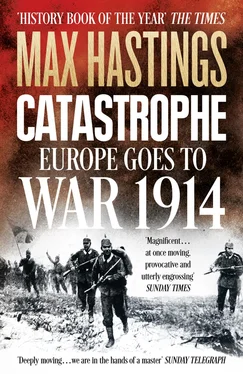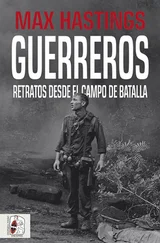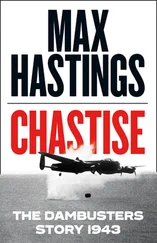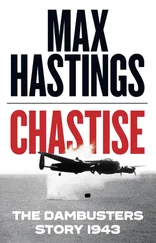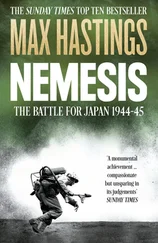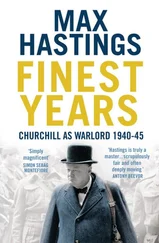The Archduke nonetheless cherished one prudent conviction: while many Austrians, notably including army chief of staff Gen. Conrad von Hötzendorf, detested Russia and welcomed the prospect of a battlefield showdown with the Tsar, Franz Ferdinand dissented. He was determined, he said repeatedly, to avoid a clash of arms. Desiring a ‘concord of emperors’, he wrote: ‘I shall never lead a war against Russia. I shall make sacrifices to avoid it. A war between Austria and Russia would end either with the overthrow of the Romanovs or with the overthrow of the Habsburgs – or perhaps the overthrow of both.’ He once wrote to Berchtold: ‘Excellency! Don’t let yourself be influenced by Conrad – ever! Not an iota of support for any of his yappings at the Emperor! Naturally he wants every possible war, every kind of hooray! rashness that will conquer Serbia and God knows what else … Through war he wants to make up for the mess that’s his responsibility at least in part. Therefore: let’s not play Balkan warriors ourselves. Let’s not stoop to this hooliganism. Let’s stay aloof and watch the scum bash in each other’s skulls. It’d be unforgivable, insane, to start something that would pit us against Russia.’
Franz Ferdinand, although as prone as Kaiser Wilhelm to outbursts of violent rhetoric, was a less reckless actor. Had the Archduke been alive when the decisive confrontation with Russia came, it is likely that his influence would have been wielded to avert war. As it was he was dead, because he insisted upon making an official visit to one of the most turbulent and perilous regions his uncle ruled. Every European monarchy shared a belief that ownership of large territories – empire – was a critical measure of virility and grandeur. While the colonies of Britain and France lay far away across oceans, those of the Hapsburgs and Romanovs were next door. Hungarian coins bore an abbreviation of the inscription ‘Francis Joseph by the Grace of God Emperor of Austria and Hungary, Croatia, Slavonia, Dalmatia, Apostolic King’. In 1908 Austria-Hungary annexed Bosnia and Herzegovina, rousing Russian fury. The twin provinces, former Ottoman possessions with mingled Serb and Muslim populations, had been Austrian-occupied since 1878, under a mandate conceded by the Congress of Berlin, but most Bosnians bitterly resented their subjection.
In 1913, a foreign diplomat exclaimed despairingly of the Austro-Hungarians: ‘Never have I seen people so determined to work against their own interests!’ It was an extraordinary folly, for an empire already groaning under the weight of its own contradictions and the frustrations of its oppressed minorities, wilfully to seize Bosnia-Herzegovina. But Franz Joseph still smarted beneath the humiliations of losing his northern Italian dominions soon after he inherited the throne, and of suffering military defeat by Prussia in 1866. The acquisition of new colonies in the Balkans seemed to offer a measure of compensation, as well as frustrating Serbia’s ambitions to incorporate them in a pan-Slav state.
Given the febrile mood in the provinces, it was rash to advertise the schedule for Franz Ferdinand’s visit to Bosnia as early as March. This prompted one of many groups of violent dissidents, the Young Bosnians, a secret society for students of peasant origins, to seize the opportunity to kill him. They reached this resolution perhaps on their own initiative, or perhaps at the behest of puppet-masters in Belgrade: in the absence of concrete evidence, either view is tenable. One of their number was nineteen-year-old Gavrilo Princip. Like many figures who have played such a role in history, Princip spent his short life striving to induce people to overcome their instinct to dismiss him because of his slight stature and colourless personality. In 1912, he volunteered to fight for Serbia in the First Balkan War, only to be rejected as too small. At his first interrogation after achieving notoriety in June 1914, he explained himself by saying, ‘Wherever I went, people took me for a weakling.’
In May, Princip and two fellow conspirators travelled to Belgrade. The city was capital of a young and volatile country, fully independent from the Ottoman Empire only since 1879, a constitutional monarchy that was heart and soul of the pan-Slav movement. Princip knew Serbia well, having lived there for two years. The ‘Young Bosnians’ were provided with four Browning semi-automatic pistols and six bombs by Maj. Vojin Tankosić of Ujedinjenje ili Smrt , a terrorist movement nicknamed ‘the Black Hand’, derived from German and Italian secret societies.
The group was led by the thirty-six-year-old head of military intelligence Col. Dragutin Dimitrijević, familiarly known as ‘Apis’, after the Egyptian bull god. He was the principal personality in one of three factions engaged in a struggle for Serbian domestic mastery. The other two elements were led respectively by Alexander, the Prince Regent – who hated the colonel because he refused to defer to the royal family – and Nikola Pašić, the prime minister. Apis looked the part of a revolutionary fanatic: pale, bald, heavy, enigmatic – like ‘a giant Mongolian’, in the words of a diplomat. He never married, devoting his life to the movement which boasted a hooded initiation ritual and a seal engraved with a skull-and-crossbones flag, a dagger, a bomb and poison. Murder was his business: he had been prominent among a group of young army officers who conducted the 1903 butchery of King Alexander of Serbia and Queen Draga in their own palace bedroom.
The Black Hand’s influence pervaded many Serbian institutions, notably including its army. Pašić, a sixty-nine-year-old of venerable appearance with his white hair and beard, was an inveterate enemy of Apis, some of whose associates in 1913 discussed murdering him. The prime minister and many of his colleagues regarded the colonel as a threat to his country’s stability and even existence; internal affairs minister Milan Protić spoke of the Black Hand to a visitor on 14 June as ‘a menace to democracy’. But in a society riven by competing interests, the civilian government lacked authority to remove or imprison Apis, who was protected by the patronage of the army chief of staff.
Beyond guns, bombs and cyanide suicide capsules, there is no hard evidence about what further support or direction Princip and his comrades received in Belgrade. The assassins went to their graves denying Serbia’s official complicity. It seems overwhelmingly probable that the Black Hand incited and instructed the Young Bosnians for the archducal murder; but all that is certain is that its agents provided them with means to commit terrorist acts in Hapsburg territory. Princip conducted pistol practice in a Belgrade park, then on 27 May enjoyed a farewell dinner with his two co-conspirators, Trifko Grabež and Nedeljko čabrinović, before starting what became an eight-day journey to Sarajevo. Part of Princip’s and Grabež’s route was covered on foot across open country, assisted by a frontier officer instructed by the Black Hand. Yet if Apis was wholly committed to the assassination plot, it is puzzling that the embryo assassin had to pawn his overcoat for a few dinars shortly before leaving Belgrade, to pay his expenses.
Who else knew what? Russia’s ambassador in Belgrade was a fanatical pan-Slavist and friend of the Black Hand, Nikolai Hartwig; it is possible that he was party to the plot. But claims that St Petersburg had prior knowledge of the assassination are unsupported by a shred of evidence, and are hard to credit. The Russian government was strongly hostile to Austria-Hungary because of its persecution of its Slav minorities, but the Tsar and his ministers had no plausible reason to want Franz Ferdinand dead.
The Bosnian peasant who guided Princip and Grabež back into Hapsburg territory – their other partner, čabrinović, travelled independently – was a Serbian government informer, who passed word about their movements, and about the bombs and pistols in their luggage, to the Interior Ministry in Belgrade. His report, which the prime minister read and summarised in his own hand, made no mention of a plot against Franz Ferdinand. Pašić commissioned an investigation, and gave orders that the movement of weapons from Serbia into Bosnia should be stopped; but he went no further. A Serbian minister later claimed that Pašić told the cabinet at the end of May or the beginning of June that some assassins were on their way to Sarajevo to kill Franz Ferdinand. Whether or not this is true – no minutes were taken of cabinet meetings – Pašić appears to have instructed Serbia’s envoy in Vienna to pass on to the Austrian authorities only a vague general warning, perhaps because he was unwilling to provide the Hapsburgs with a fresh and extremely serious grievance against his country.
Читать дальше
